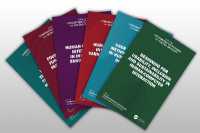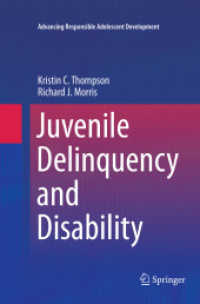Full Description
Engaging Questions: A Guide to Writing takes a practical approach to composing, with a view that good writing occurs in the context of critical thinking. By using a consistent methodology that prompts students to learn and practice "the art of questioning," Engaging Questions: A Guide to Writing presents writing as one essential part of the critical thinking whole, ultimately empowering students to become skilled thinkers and confident writers.
Contents
PART I Exploring Writing and Reading 1 CHAPTER 1Critical Thinking and the Art of Questioning 2
Why Is Questioning Important? 2
What Do I Really Think? 4
What Does That Word Mean? 5
Is That Statement Accurate? 6
Is That Statement True? 6
What Do You Gain from Thinking Critically? 7
R E A D I N G
Apparently Facts No Longer Mean What They Once Did by Leonard Pitts 9
CHAPTER 2 Reading Critically and the Art of Questioning 12
What Is Critical Reading? 12
How Does Critical Reading Work? 13
What Questions Guide Critical Reading? 13
THE ASSIGNMENT 30
What Could I Write About? 30
What Is My Rhetorical Situation? 30
R E A D I N G
Notes of an Alien Son: Immigration Paradoxes by Andrei Codrescu 17
CHAPTER 3 Writing and the Art of Questioning 32
What Is Good Writing? 32
What Is the Rhetorical Situation? 32
Why Ask about the Rhetorical Situation? 32
What Is Voice? 34
Why Does Voice Matter? 35
What Is an Angle? 36
THE ASSIGNMENT 39
What Could I Write About? 39
What Is My Rhetorical Situation? 39
R E A D I N G S
What Is Paleontology? by University of California Museum of Paleontology 34
Planet of Weeds by David Quammen 35
PART II Practicing Writing 43 CHAPTER 4 Claiming Voice 44
What Is Voice? 44
Why Care about Voice? 46
THE ASSIGNMENT 47
How Do I Claim My Voice? Engaging the Writing Process 49
How Do I Use Spontaneous Style? 49
How Do I Use Conscious Style? 50
How Do I Extend My Voice? 53
CHAPTER 5 Interpreting Experiences 61
What Is Interpreting Experience? 61
Why Write to Interpret Experience? 62
How Do Writers Interpret Experiences? 62
THE ASSIGNMENT 71
What Can I Write About? 71
How Do I Interpret Experience? Questioning the Rhetorical Situation 72
How Do I Interpret Experience? Engaging the Writing Process 73
R E A D I N G S
A Dark, Skinny Stranger in Cleveland Park by Stephen L. Carter 64
Driving Away by Katherine Krueger-Land 66
CHAPTER 6 Creating Profiles 84
What Is a Profile? 84
Why Write Profiles? 84
How Do Writers Compose Profiles? 86
THE ASSIGNMENT 95
What Can I Write About? 95
How Do I Write a Profile? Questioning the Rhetorical Situation 95
How Do I Write a Profile? Engaging the Writing Process 98
R E A D I N G S
Writing with the Master by Joel Achenbach 87
We're Losing the Raw Human Part of Being with Each Other by Catherine de Lange 92
CHAPTER 7 Presenting Information 112
What Is Presenting Information? 112
Why Present Information? 113
How Do Writers Present Information? 114
THE ASSIGNMENT 124
What Can I Write About? 124
How Do I Present Information? Questioning the Rhetorical Situation 125
How Do I Present Information? Engaging the Writing Process 126
R E A D I N G S
Tomorrow, I Love Ya! by Eric Hoover 115
Major Survey Challenges Western Perceptions of Islam by Agence France-Press (AFP) 122
CHAPTER 8 Exploring a Concept 142
What Is Concept Exploration? 143
Why Explore Concepts? 144
How Do Writers Explore a Concept? 144
THE ASSIGNMENT 152
What Can I Write About? 152
How Do I Explore Concepts? Questioning the Rhetorical Situation 154
How Do I Explore Concepts? Engaging the Writing Process 155
R E A D I N G S
The Supreme Chutzpah by Jack Achiezer Guggenheim 145
What Is Civility? by P. M. Forni 148
CHAPTER 9 Comparing Perspectives 168
What Is Comparing Perspectives? 168
Why Write to Compare Perspectives? 169
How Do Writers Compare Perspectives? 170
THE ASSIGNMENT 183
How Do I Compare Perspectives? Questioning the Rhetorical Situation 184
How Do I Compare Perspectives? Engaging the Writing Process 185
R E A D I N G S
Which Character Should Sports Develop? by Andy Rudd 170
The Human Cost of Animal Suffering by Mark Bittman 173
Eating Well vs. Being Good by David Katz 175
The Ethics of Eating Meat by Paul Schwennesen 179
Reciprocity: A Foundation for Balance by Clara Sue Kidwell, Homer Noley, and George E. "Tink" Tinker 181
CHAPTER 10 Critiquing an Argument 201
What Is a Critique? 201
Why Write to Critique an Argument? 202
How Do Writers Critique Arguments? 202
THE ASSIGNMENT 207
What Can I Write About? 207
How Do I Write a Critique? Questioning the Rhetorical Situation 207
How Do I Write a Critique? Engaging the Writing Process 209
SAMPLE READINGS FOR CRITIQUE 224
R E A D I N G S
Why Sherry Turkle Is So Wrong by Tom Stafford 203
Open Your Ears to Biased Professors by David Fryman 210
The Bogus Case against Birthright Citizenship by Shikha Dalmia 224
CHAPTER 11 Making a Case 227
What Is a Case? 227
Why Make a Case? 228
How Do Writers Make a Case? 229
THE ASSIGNMENT 239
What Can I Write About? 240
How Do I Make a Case? Questioning the Rhetorical Situation 240
How Do I Make a Case? Engaging the Writing Process 242
R E A D I N G S
Building a Better Life through Greenways and Trails by Trails and Greenways Clearinghouse 229
The Case against Grades by Alfie Kohn 233
CHAPTER 12 Appealing for Action 257
What Is Persuasion? 257
Why Write to Persuade? 258
How Do Writers Persuade? 258
THE ASSIGNMENT 265
What Can I Write About? 265
How Do I Appeal for Action? Questioning the Rhetorical Situation 266
How Do I Write Persuasively? Engaging the Writing Process 267
R E A D I N G S
Where Sweatshops Are a Dream by Nicholas D. Kristof 259
The Factories of Lost Children by Katharine Weber 262
CHAPTER 13 Writing an Evaluation 283 What Is an Evaluation? 283
Why Write to Evaluate? 284
How Do Writers Evaluate? 284
THE ASSIGNMENT 292
What Can I Write About? 292
How Do I Write an Evaluation? Questioning the Rhetorical Situation 293
How Do I Write an Evaluation? Engaging the Writing Process 295
R E A D I N G S
2011 Motor Trend Car of the Year: Chevrolet Volt, A Car of the Future You Can Drive Today by Angus MacKenzie 285
`Precious' Mettle by Ann Hornaday 289
CHAPTER 14 Editing Fundamentals 305
What Is Editing? 305
Why Edit? 306
How Do Writers Edit? 306
What Is the Spiraling Down Method? 307
What Matters Most in Editing? Three Key Points 318
PART III Researching Writing 319 CHAPTER 15 Planning a Research Project 320
When Is Research Necessary? 320
What Kinds of Sources Do College Researchers Use? 321
How Do I Plan a Research Project? 325
How Do I Choose and Narrow a Topic? 328
How Do I Turn a Topic into a Research Question? 329
How Do I Manage the Sources I Find? 330
CHAPTER 16 Finding Sources 336
How Do I Conduct a Keyword Search? 336
What Resources Can I Find through My College Library? 338
How Do I Find Reference Works through My College Library? 339
How Do I Use a Library Catalog to Find Books and Other Resources? 341
How Do I Use Library Databases to Find Periodicals? 343
How Do I Use the Web to Find Reliable Websites and Online Journals? 344
How Do I Find Interactive Online Sources? 347
How Do I Generate My Own Information? 347
CHAPTER 17 Evaluating Sources 350
How Do I Decide If a Source Is Useful? 350
How Do I Decide If a Source Is Reliable? 351
How Do I Evaluate a Website? 353
CHAPTER 18 Incorporating Source Materials 357
What Does It Mean to Enter the Conversation? 357
How Does Informal Writing Engage Me in the Conversation? 358
How Do I Draw Connections between Sources? 361
What Roles Can Sources Play in My Writing? 363
What Are My Options for Bringing in Source Material? 364
How Do I Acknowledge, Integrate, and Cite My Source Materials? 369
What Are the Options for Acknowledging Sources? 371
How Can I Integrate Source Material into My Writing? 372
How Do I Document My Sources? 376
How Do I Incorporate Sources without Losing My Own Voice? 377
R E A D I N G
New Hampshire Professor Pushes for Return to Slow Reading by Holly Ramer 359
CHAPTER 19 Using Sources Responsibly 379
What Is Plagiarism? 379
When Do I Need to Cite My Sources? 380
How Can I Avoid Plagiarizing? 383
CHAPTER 20 Documenting Your Sources: MLA 385
How Do I Make In-Text Citations Using MLA Style? 385
How Do I Make Entries in the Works Ci
ted List Using MLA Style? 390
CHAPTER 21 Documenting Your Sources: APA 411
How Do I Make In-Text Citations Using APA Style? 411
How Do I Make Entries in a Reference List Using APA Style? 416
CHAPTER 22 Choosing Strategies of Development 435
What Are the Strategies? 435
How Do Writers Choose Strategies? 439
What Do the Strategies Look Like in Detail? 440
How Can I Develop a Repertoire of Strategies? 460
R E A D I N G
Is Climate Disaster Inevitable? by Adam Frank 436
CHAPTER 23 Designing Documents and Using Graphics 461
What Are Document Design and Graphics? 461
Why Consider Document Design and Graphics? 462
How Does Document Design Work? 462
How Do Graphics Work? 467
What Are the Common Model Documents? 472
What Matters Most in Document Design and Using Graphics? 486
CHAPTER 24 Writing Portfolios 488
What Is a Writing Portfolio? 488
Why Create a Writing Portfolio? 490
How Do Writers Prepare Portfolios? 491
THE ASSIGNMENT 492
How Do I Reflect? Questioning the Rhetorical Situation 492
CHAPTER 25 Mastering Essay Exams 498
What Are Essay Exams? 498
Why Do Instructors Assign Essay Exams? 498
How Do Writers Approach Essay Exam Questions? 499
How Should I Prepare for an Essay Exam? 501
What Are Some Good Strategies for Taking an Essay Exam? 503
What Is the Value of Essay Exams? 508
CHAPTER 26 Giving Oral Presentations 509
What Are Oral Presentations? 509
How Do I Prepare an Oral Presentation? 514
How Do I Rehearse an Oral Presentation? 515
How Do I Revise an Oral Presentation? 516
How Do I Deliver an Oral Presentation? 516
What Are Some Key Points to Remember? 517
CHAPTER 27 How Do I Write a Rhetorical Analysis? 518
What Is a Rhetorical Analysis? 518
Why Write a Rhetorical Analysis? 518
What Can I Write About? 521
How Do I Prepare to Write a Rhetorical Analysis? 521
What Are the Steps in Writing a Rhetorical Analysis? 522
E X A M P L E
Rhetorical Analysis of the Section on the Church in "Letter from Birmingham Jail" by Ginny Norton 519
CHAPTER 28 How Do I Write a Blog? 524
What Is a Blog? 524
Why Write a Blog? 525
What Can I Write About? 527
How Do I Prepare to Write a Blog Post? 528
What Are the Steps in Writing a Blog Post? 529
What Are Some Special Considerations for Writing a Blog? 530
CHAPTER 29 How Do I Write a Reflection? 532
What Is a Reflection? 532
Why Write a Reflection? 532
What Can I Write About? 535
How Do I Prepare to Write a Reflection? 536
What Are the Steps in Writing a Reflection? 537
E X A M P L E
The Wonder of Ordinary Places by Julian Hoffman 533
CHAPTER 30 How Do I Write a Visual Analysis? 539
What Is a Visual Analysis? 539
Why Write a Visual Analysis? 540
What Can I Write About? 543
How Do I Prepare to Write a Visual Analysis? 543
What Are the Steps in Writing a Visual Analysis? 545
E X A M P L E
Three Girls in a Kentucky Kitchen by Ashley Jarol 540
CHAPTER 31 How Do I Write a Review? 546
What Is a Review? 546
Why Write a Review? 547
What Can I Write About? 550
How Do I Prepare to Write a Review? 550
What Are the Steps in Writing a Review? 551
E X A M P L E
Review of Water for Elephants (by Sara Gruen) by Danielle Poiesz 547
CHAPTER 32 How Do I Write an Editorial or Opinion Column? 553
What Is an Editorial? 553
Why Write an Editorial? 554
What Can I Write About? 556
How Do I Prepare to Write an Editorial? 556
What Are the Steps in Writing an Editorial? 557
E X A M P L E
Where History Lessons Come Alive by Matt Watson 554
CHAPTER 33 How Do I Write a Proposal? 559
What Is a Proposal? 559
Why Write a Proposal? 560
What Can I Write About? 566
How Do I Prepare to Write a Proposal? 567
What Are the Steps in Writing a Proposal? 568
E X A M P L E
Proposal to Enact a "Smoke- Free Campus" Policy for Santa Clara University 560
CHAPTER 34 How Do I Write a Research Proposal? 570
What Is a Research Proposal? 570
Why Write a Research Proposal? 571
What Can I Write About? 571
How Do I Prepare to Write a Research Proposal? 573
What Are the Steps in Writing a Research Proposal? 574
E X A M P L E
Research Proposal for a Paper, "Civility in the Workplace" by Amie Hazama 571
CHAPTER 35 How Do I Write an Annotated Bibliography? 575
What Is an Annotated Bibliography? 575
Why Do Writers Create Annotated Bibliographies? 575
What Should an Annotation Include? 576
What Do Annotated Bibliography Entries Look Like? 576
How Can I Support Academic Honesty When Writing Annotations? 578
CHAPTER 36 How Do I Write a Prospectus? 579
What Is a Prospectus? 579
Why Write a Prospectus? 580
How Does a Prospectus Function in Other Situations? 581
How Do I Prepare to Write a Prospectus? 582
What Are the Steps in Writing a Prospectus? 582
E X A M P L E
Prospectus for "Multitasking: A Poor Study Habit" by Noelle Alberto 580
CHAPTER 37 How Do I Write a Lab Report? 584
What Is a Lab Report? 584
Why Write a Lab Report? 585
How Do I Prepare to Write a Lab Report? 588
What Are the Steps in Writing a Lab Report? 589
E X A M P L E
Transpiration by Deborah A. Smith 585
CHAPTER 38 How Do I Write Instructions? 592
What Are Instructions? 592
Why Write Instructions? 593
What Can I Write About? 595
How Do I Prepare to Write Instructions? 595
What Are the Steps in Writing Instructions? 596
E X A M P L E
How to Do the Heimlich Maneuver by Deaconess Heimlich Institute 593
CHAPTER 39 How Do I Write an Abstract? 598
What Is an Abstract? 598
Why Write an Abstract? 598
How Do I Prepare to Write an Abstract? 600
What Are the Steps in Writing an Abstract? 600
E X A M P L E
Abstract of "Popularity's Downside" by Audra Ames 599








